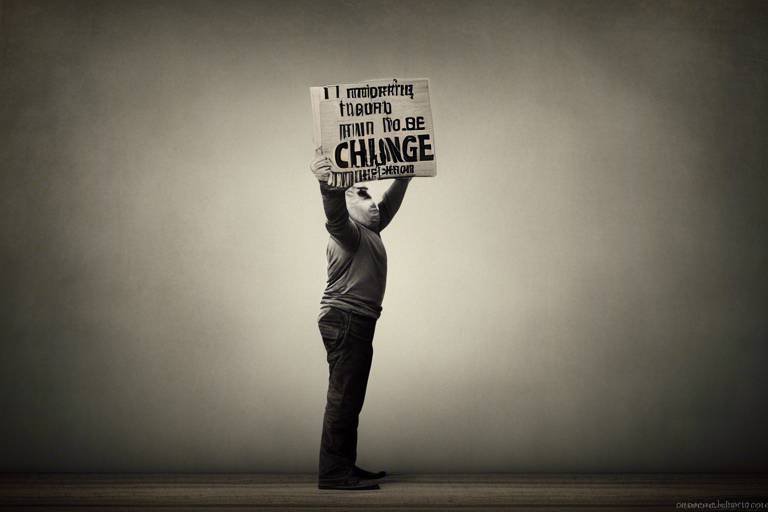The Philosophy of Wealth and Poverty
This article explores the philosophical underpinnings of wealth and poverty, examining their implications on society, ethics, and individual well-being. It delves into various perspectives and theories that shape our understanding of these concepts.
Wealth can be defined in various ways, including material possessions, resources, and opportunities. Philosophically speaking, wealth isn't just about the shiny cars or the big houses; it represents a tool for human flourishing and societal progress. Think of wealth as a double-edged sword—it can create opportunities for growth and innovation, but it can also create divides that separate us from one another. Wealth can empower individuals to pursue their dreams, invest in their communities, and contribute positively to society. However, it raises questions about the responsibility that comes with it. Should the wealthy be expected to share their fortunes? Is it ethical to hoard wealth while others struggle?
Poverty is often viewed simply as a lack of resources, but this interpretation is far too narrow. Philosophically, poverty extends beyond mere material deprivation; it touches on issues of human dignity and potential. Imagine living in a world where your basic needs are unmet—how would that affect your sense of self-worth? Poverty can strip individuals of their dignity, making it difficult for them to see their own value in society. It's not just about having less money; it's about the impact on human potential and the opportunities that are lost as a result. The implications of poverty can ripple through generations, affecting not just the impoverished but society as a whole.
The relationship between wealth and happiness has been debated extensively, with some arguing that wealth is a key to happiness, while others contend that it merely serves as a means to an end. So, does money really buy happiness? This question is as old as time, and the answers are as varied as the people who seek them. Many studies suggest that while wealth can provide comfort and security, it does not guarantee genuine happiness. In fact, the pursuit of wealth can sometimes lead to a cycle of discontent and dissatisfaction.
The hedonic treadmill theory suggests that people quickly return to a baseline level of happiness despite changes in wealth. This means that as we acquire more wealth, our expectations and desires also increase, leading us to chase after more. Picture a hamster on a wheel—no matter how fast it runs, it stays in the same spot. This theory challenges the notion that accumulating wealth will lead to lasting happiness, prompting us to rethink our motivations and desires. If wealth doesn't equate to happiness, then what does?
Wealth inequality raises ethical questions about fairness and justice. When a small percentage of the population controls a large portion of wealth, it creates a chasm that can destabilize society. Philosophical perspectives on wealth distribution argue for a more equitable approach, suggesting that the affluent have moral responsibilities towards the impoverished. Shouldn't those with more resources help lift others? This debate often leads to discussions about social justice, equity, and the moral obligations we hold towards one another in a community.
This section delves into the moral considerations surrounding wealth accumulation. Is it ethical to pursue wealth, and what responsibilities come with financial success? Some argue that the pursuit of wealth is a natural human inclination, while others believe it can lead to greed and exploitation. The ethical implications of wealth accumulation are complex, and they force us to confront uncomfortable questions about our values and priorities. Are we chasing wealth for personal gain, or are we considering the broader impact of our choices on society?
Different cultures have unique views on wealth and poverty, influencing societal values and behaviors. What might be considered a sign of success in one culture could be viewed as a burden in another. For instance, in some societies, communal wealth and sharing are valued over individual accumulation. This cultural context shapes our understanding of wealth and poverty, reminding us that there is no one-size-fits-all approach to these concepts.
Many religions offer distinct teachings about wealth and poverty. For example, in Christianity, there is a strong emphasis on charity and helping the less fortunate, while Buddhism teaches that attachment to material possessions can lead to suffering. These religious beliefs shape followers' attitudes toward material possessions and charitable giving, encouraging a sense of responsibility towards others.
Philosophical theories of justice, such as utilitarianism and egalitarianism, provide frameworks for understanding wealth and poverty. Utilitarianism suggests that actions should be judged based on their outcomes, advocating for policies that maximize overall happiness. On the other hand, egalitarianism stresses the importance of equality, arguing for a fair distribution of wealth to ensure everyone has access to basic needs. These theories inform our views on economic systems and social policies, guiding us toward a more just society.
- What is the main difference between wealth and poverty? Wealth refers to an abundance of valuable resources or material possessions, while poverty indicates a lack of these resources.
- Can wealth lead to happiness? While wealth can provide comfort, it does not guarantee happiness. The relationship is complex and influenced by various factors.
- What are the ethical responsibilities of the wealthy? The wealthy have a moral obligation to contribute positively to society, which may include philanthropy and addressing wealth inequality.
- How do cultural perspectives affect views on wealth? Different cultures prioritize wealth and poverty in unique ways, shaping societal values and behaviors around these concepts.

The Nature of Wealth
Wealth is often seen as a tangible collection of material possessions, but its essence runs much deeper. It's not just about the cash in your wallet or the size of your house; wealth encompasses a broader spectrum that includes resources, opportunities, and even social capital. Think of wealth as a multifaceted gem, where each facet represents a different aspect of human experience. The philosophical dimensions of wealth invite us to ponder its role in human flourishing and societal progress.
At its core, wealth can be categorized into several types:
- Material Wealth: This includes physical assets like property, cars, and money.
- Social Wealth: The value of relationships and networks that can provide support and opportunities.
- Cultural Wealth: Knowledge, education, and skills that enhance personal and communal growth.
- Emotional Wealth: The sense of well-being and fulfillment derived from life experiences and relationships.
Many philosophers argue that the accumulation of wealth is not merely about personal gain; it reflects our values and priorities as a society. For instance, consider how wealth can act as a double-edged sword. On one hand, it can empower individuals to pursue their passions, invest in their communities, and create lasting change. On the other hand, it can lead to a sense of entitlement, greed, and a disconnection from those who lack similar resources. This duality raises an essential question: What is the true purpose of wealth?
Wealth’s role in human flourishing cannot be underestimated. When individuals have access to adequate resources, they are more likely to achieve their potential. They can pursue education, engage in creative endeavors, and contribute positively to society. In this sense, wealth becomes a tool for empowerment rather than just a measure of success. However, we must also acknowledge that the mere presence of wealth does not guarantee happiness or fulfillment. This brings us to the philosophical debate surrounding the relationship between wealth and happiness.
As we delve deeper into the nature of wealth, we must also consider the ethical implications of wealth distribution. In a world where resources are finite, how we allocate wealth can significantly impact societal progress. Philosophers like John Rawls have argued for principles of justice and fairness in wealth distribution, suggesting that a just society should prioritize the well-being of its least advantaged members. This perspective challenges us to reflect on our responsibilities towards others, particularly those who are less fortunate.
In conclusion, the nature of wealth is a complex interplay of material, social, cultural, and emotional elements. It serves as a foundation for individual and societal growth, yet it also raises ethical questions that demand our attention. As we navigate our own paths to wealth, let us remember the broader implications of our choices and strive for a balance that fosters both personal success and collective well-being.

The Concept of Poverty
Poverty is often perceived simply as a lack of financial resources, but this narrow definition fails to capture its profound implications on human dignity, potential, and societal structure. When we think about poverty, it’s essential to recognize that it encompasses more than just insufficient income; it reflects a multitude of factors that can strip individuals of their basic rights and opportunities. Imagine living in a world where basic needs like food, shelter, and education are not just luxuries but distant dreams. This is the stark reality for millions around the globe.
Philosophically, poverty raises critical questions about what it means to live a fulfilling life. The implications of being impoverished stretch far beyond material deprivation. It can lead to feelings of shame, isolation, and hopelessness, which can stifle an individual's aspirations and potential. In many ways, poverty is a social construct that can be influenced by systemic factors such as race, geography, and economic policy. For instance, individuals living in rural areas may face barriers to accessing quality education and healthcare, perpetuating a cycle of poverty that is difficult to escape.
Moreover, poverty can be understood through various lenses, including ethical, psychological, and sociological perspectives. From an ethical standpoint, one might ask: Is it just for a society to allow such disparities to exist? The answer varies depending on cultural values and philosophical beliefs. Some argue that wealth should be distributed more equitably to ensure everyone has access to the resources necessary for a decent quality of life. Others may contend that individual effort and merit should determine one’s financial success, regardless of the inherent inequalities present.
Interestingly, poverty also has a significant impact on mental and physical health. Numerous studies indicate that individuals living in poverty are more prone to chronic illnesses, mental health disorders, and even premature death. This creates a vicious cycle where poor health further exacerbates economic hardship. The table below illustrates some of the key statistics related to poverty and health:
| Statistic | Impact |
|---|---|
| Individuals in poverty are 2.5 times more likely to report poor health. | Increased healthcare costs and decreased productivity. |
| Children in low-income families are more likely to experience developmental delays. | Long-term educational and economic consequences. |
| People in poverty are at a higher risk for mental health disorders. | Increased stigma and barriers to accessing care. |
In light of these complexities, it’s crucial to approach the concept of poverty with empathy and a willingness to understand the broader societal implications. Poverty is not just an individual failing; it is a collective issue that reflects the values and structures of our society. Addressing poverty requires a multifaceted approach that combines economic reform, social support, and community engagement. By acknowledging the deeper meanings behind poverty, we can work towards solutions that not only alleviate material deprivation but also restore dignity and opportunity to those affected.
- What is the primary cause of poverty?
Poverty is caused by a combination of factors, including economic conditions, lack of education, systemic inequality, and health issues. - How does poverty affect mental health?
Poverty can lead to increased stress, anxiety, and depression, significantly impacting overall mental well-being. - What can be done to reduce poverty?
Effective solutions include improving access to education, healthcare, and job opportunities, as well as implementing fair economic policies.

The relationship between wealth and happiness is a complex tapestry woven with threads of philosophy, psychology, and personal experience. Many people assume that having more money will automatically lead to greater happiness. After all, who wouldn’t want to live in a cozy home, travel the world, and indulge in their favorite luxuries? However, the reality is often more nuanced. While wealth can provide comfort and security, it does not guarantee joy or fulfillment.
One of the most intriguing philosophical arguments revolves around the idea that wealth is merely a means to an end. It can buy you a beautiful house, a fancy car, or the latest gadgets, but can it buy you true happiness? Many studies suggest that once our basic needs are met—think food, shelter, and safety—additional wealth yields diminishing returns in terms of happiness. This phenomenon is often referred to as the hedonic treadmill, where individuals quickly adapt to their new circumstances and return to their baseline level of happiness.
Consider this: if you were to win the lottery, you might feel an initial rush of excitement and joy. However, as time passes, that euphoric feeling may fade, and you might find yourself yearning for something more. This emotional rollercoaster prompts us to question whether the pursuit of wealth is truly the path to happiness or merely a distraction from deeper, more meaningful pursuits.
Moreover, wealth inequality raises ethical questions about happiness and fulfillment. If wealth is concentrated in the hands of a few, what does that mean for the majority? It leads to a society where happiness is not evenly distributed, creating a landscape of discontent and frustration for those who struggle to make ends meet. In this context, the affluent might find themselves grappling with guilt or a sense of responsibility towards those less fortunate. The question then arises: should the wealthy use their resources to uplift others, thereby enhancing collective happiness?
Ultimately, the interplay between wealth and happiness invites us to reflect on our values and priorities. Are we chasing wealth for its own sake, or are we seeking the freedom and opportunities it can provide? Many argue that true happiness stems from relationships, purpose, and personal growth, rather than material possessions. Perhaps the key lies in finding a balance between financial stability and the pursuit of a fulfilling life.
In summary, while wealth can facilitate certain aspects of happiness, it is not a guaranteed path to emotional well-being. The journey towards happiness may instead require a deeper exploration of what truly matters in our lives. As we navigate this intricate relationship, it becomes increasingly clear that wealth should serve as a tool for enhancing our experiences, not the ultimate goal itself.
- Can wealth buy happiness? While wealth can provide comfort and security, studies show that after basic needs are met, additional wealth does not significantly increase happiness.
- What is the hedonic treadmill? The hedonic treadmill theory suggests that people quickly return to a baseline level of happiness despite changes in their wealth or circumstances.
- How does wealth inequality affect happiness? Wealth inequality can lead to societal discontent, where happiness is not evenly distributed, raising ethical questions about the responsibilities of the affluent.
- What are the key factors for happiness? Many people find that relationships, purpose, and personal growth contribute more to happiness than material wealth.

The Hedonic Treadmill
The concept of the hedonic treadmill is a fascinating psychological theory that suggests people tend to return to a relatively stable level of happiness, regardless of the changes in their circumstances, including wealth. Imagine running on a treadmill: no matter how fast you go, you remain in the same spot. This metaphor perfectly encapsulates the idea that as we acquire more wealth or experience positive changes in our lives, our expectations and desires also shift, leading us to seek even more. Consequently, the initial boost in happiness we experience from new possessions or financial gains quickly fades, and we find ourselves back at our baseline level of contentment.
Research indicates that while wealth can provide comfort and security, it does not guarantee lasting happiness. For instance, a study by the Journal of Happiness Studies found that individuals who experience a sudden influx of wealth, such as winning the lottery, often report a temporary spike in happiness. However, within a few months, their overall happiness levels tend to revert to where they were before the windfall. This phenomenon raises important questions about the true nature of happiness and the role that wealth plays in our lives.
One critical aspect of the hedonic treadmill is the idea of relative wealth. People often compare themselves to others, which means that as their wealth increases, they may still feel dissatisfied if they perceive others as better off. This comparison can lead to a cycle of perpetual striving, where individuals are always chasing after the next big thing, whether it’s a new car, a bigger house, or a more luxurious lifestyle. The treadmill never stops, and the finish line keeps moving further away.
To illustrate this point, consider the following table that summarizes key findings related to the hedonic treadmill:
| Aspect | Impact on Happiness |
|---|---|
| Initial Wealth Increase | Temporary boost in happiness |
| Comparison with Peers | Feelings of inadequacy and dissatisfaction |
| Long-term Wealth Accumulation | Returns to baseline happiness levels |
| Adaptation to New Circumstances | Quick adjustment to new normal |
So, what does this mean for those of us on the quest for happiness? It suggests that perhaps we should focus less on accumulating wealth and more on cultivating meaningful experiences and relationships. Engaging in activities that promote personal growth, community involvement, and emotional connections can lead to a more fulfilling life. In the grand scheme of things, happiness might not be about how much we have but rather how we choose to live our lives.
- What is the hedonic treadmill? The hedonic treadmill is a psychological theory suggesting that people quickly return to a baseline level of happiness after experiencing changes in their circumstances, such as acquiring wealth.
- Does wealth guarantee happiness? No, research shows that while wealth can provide temporary happiness, it does not ensure long-term contentment.
- How can I achieve lasting happiness? Focus on building meaningful relationships, engaging in fulfilling activities, and practicing gratitude rather than solely pursuing material wealth.

Wealth Inequality and Social Justice
Wealth inequality is a pressing issue that raises significant ethical questions about fairness and justice in society. As the gap between the rich and the poor continues to widen, we must ask ourselves: what does this mean for social cohesion and individual dignity? At the heart of this debate lies the philosophical inquiry into whether wealth should be distributed more equitably and what moral responsibilities the affluent have towards those who are less fortunate.
Many philosophers argue that extreme wealth inequality undermines the very fabric of a just society. For instance, John Rawls, in his theory of justice, posits that social and economic inequalities should be arranged to benefit the least advantaged members of society. This perspective challenges us to consider not just the distribution of wealth, but also the opportunities available to all individuals. If a society allows a small percentage of its population to accumulate vast amounts of wealth while others struggle to meet basic needs, is that society truly just?
Moreover, wealth inequality can lead to a sense of disenfranchisement among the less privileged. When individuals feel that they have no stake in the system, it can result in social unrest and a breakdown of trust in institutions. This is where the concept of social justice becomes crucial. It advocates for a more equitable distribution of wealth, opportunities, and privileges within a society. The question then arises: how can we create a more just society?
One approach to addressing wealth inequality is through progressive taxation, which aims to redistribute wealth more fairly. By imposing higher tax rates on the wealthy, governments can fund social programs that benefit the less fortunate. This concept is not merely about taking from the rich to give to the poor; it’s about ensuring that everyone has access to essential services such as education, healthcare, and housing. In essence, it’s about creating a level playing field where everyone has the opportunity to succeed.
Additionally, the role of corporations in perpetuating wealth inequality cannot be overlooked. Many companies prioritize profits over social responsibility, often leading to exploitative labor practices and environmental degradation. As consumers, we have the power to influence corporate behavior by supporting businesses that prioritize ethical practices. By making conscious choices, we can contribute to a shift towards a more equitable economy.
In conclusion, addressing wealth inequality is not just a matter of economic policy; it is a moral imperative that calls for collective action. By fostering a culture of empathy and responsibility, we can work towards a society where wealth is not hoarded by a few, but shared for the benefit of all. Only then can we begin to realize the true meaning of social justice.
- What is wealth inequality? Wealth inequality refers to the unequal distribution of assets among individuals or groups within a society.
- Why is wealth inequality a problem? It creates social tensions, undermines trust in institutions, and limits opportunities for the less fortunate.
- How can we address wealth inequality? Through progressive taxation, corporate social responsibility, and promoting equitable access to resources.
- What role do individuals play in combating wealth inequality? Individuals can make informed consumer choices and advocate for policies that promote social justice.

The Ethics of Wealth Accumulation
When we think about wealth accumulation, a myriad of questions arise that touch upon morality and ethics. Is it ethical to pursue wealth? What responsibilities come with financial success? These questions are not just philosophical musings; they have real-world implications that affect individuals and society as a whole. Wealth, in its essence, can be seen as a tool, a means to achieve personal goals and support loved ones. However, the ethical landscape becomes murky when we consider how that wealth is acquired and the impact it has on others.
In many cultures, the pursuit of wealth is celebrated, often viewed as a hallmark of success. Yet, this celebration can lead to a dangerous mindset where the ends justify the means. For instance, individuals might engage in unethical practices—such as exploiting labor, manipulating markets, or engaging in fraudulent activities—just to increase their financial standing. This raises an important ethical dilemma: at what point does the pursuit of wealth become morally questionable? The answer is often subjective, varying greatly from person to person based on their values, upbringing, and societal context.
Moreover, the accumulation of wealth invariably creates a ripple effect throughout society. The affluent have the potential to create opportunities for others, yet they also bear a moral responsibility to consider the broader implications of their wealth. This is where the concept of social responsibility comes into play. Wealthy individuals and corporations are often expected to contribute to societal well-being, whether through philanthropy, ethical business practices, or community engagement. The question then becomes: how much is enough? Is there a threshold of wealth where one’s ethical obligations to society increase?
To further explore this ethical terrain, let’s consider some key principles that often guide discussions around wealth accumulation:
- Utilitarianism: This principle suggests that actions are right if they promote the greatest happiness for the greatest number. In terms of wealth, it raises the question of whether accumulating wealth contributes positively to society as a whole.
- Egalitarianism: This perspective emphasizes equality and fairness in wealth distribution. It challenges the idea that wealth should be concentrated in the hands of a few, advocating instead for a more equitable distribution of resources.
- Virtue Ethics: This approach focuses on the character of the individual rather than on the consequences of their actions. It prompts individuals to consider whether their pursuit of wealth aligns with virtues such as honesty, compassion, and integrity.
In conclusion, the ethics of wealth accumulation is a complex tapestry woven from various threads of philosophy, culture, and personal values. While the pursuit of wealth can lead to personal success and societal advancement, it also carries with it a weighty responsibility. As we navigate this landscape, it is crucial to reflect on our motivations, the means by which we acquire wealth, and our obligations to those around us. After all, true wealth is not just measured in dollars and cents but in the positive impact we can have on the world.
- Is it wrong to seek wealth? No, seeking wealth is not inherently wrong. It becomes a moral issue when unethical means are employed to acquire it.
- What responsibilities do wealthy individuals have? Wealthy individuals are often expected to contribute to society through philanthropy, ethical business practices, and community support.
- How can wealth be accumulated ethically? Wealth can be accumulated ethically by engaging in fair business practices, ensuring equitable treatment of employees, and being transparent in financial dealings.

Cultural Perspectives on Wealth and Poverty
The way we perceive wealth and poverty is deeply influenced by our cultural backgrounds. Different cultures have their own narratives, values, and traditions that shape how individuals and communities understand these concepts. For instance, in some cultures, wealth is seen as a reward for hard work and intelligence, while in others, it may be viewed with suspicion or as a source of moral decay. This dichotomy raises intriguing questions: Is wealth inherently good, or does it carry ethical implications? How does poverty shape our understanding of human dignity and potential?
In many Western societies, wealth accumulation is often celebrated as a sign of success and personal achievement. The American Dream epitomizes this belief, suggesting that anyone, regardless of their background, can achieve prosperity through effort and determination. This cultural narrative promotes the idea that financial success is a reflection of individual merit. However, this perspective can lead to the stigmatization of poverty, as those who struggle financially may be perceived as lacking ambition or capability. The societal pressure to succeed can create a relentless pursuit of wealth, often at the expense of personal well-being and relationships.
Conversely, some Eastern cultures, such as those influenced by Buddhist teachings, advocate for a more moderate approach to wealth. In these contexts, material possessions are often seen as transient and potentially distracting from spiritual growth. The emphasis is placed on community and collective well-being rather than individual wealth. This cultural perspective encourages a sense of responsibility towards others, promoting values like generosity and humility. In such societies, poverty may not be viewed solely as a personal failure, but rather as a social issue that requires communal support and intervention.
Moreover, indigenous cultures around the world often have unique relationships with wealth and poverty that differ significantly from mainstream societal views. Many indigenous communities prioritize land and natural resources over monetary wealth, emphasizing sustainability and stewardship of the earth. In these cultures, the concept of wealth is intertwined with social responsibilities and the well-being of future generations. This holistic view fosters a sense of interconnectedness, where poverty is not just an individual plight but a communal challenge that needs to be addressed collectively.
To illustrate these diverse perspectives, consider the following table that summarizes how different cultures view wealth and poverty:
| Cultural Context | View on Wealth | View on Poverty |
|---|---|---|
| Western Cultures | Success and achievement | Personal failure or lack of ambition |
| Eastern Cultures | Transitory and a distraction from spiritual growth | Social issue requiring communal support |
| Indigenous Cultures | Stewardship of resources, emphasizing sustainability | Communal challenge needing collective action |
As we delve deeper into these cultural perspectives, it becomes clear that our understanding of wealth and poverty is not merely a reflection of economic status but is also shaped by the values and beliefs we hold. The interplay between culture and economics invites us to question our own assumptions and biases. Are we viewing wealth through a narrow lens, or are we open to the rich tapestry of meanings that different cultures offer?
In conclusion, the cultural perspectives on wealth and poverty are as diverse as humanity itself. They challenge us to rethink our definitions of success and failure, urging us to consider the broader implications of our economic systems. By embracing these varied viewpoints, we can foster a more inclusive dialogue about wealth, poverty, and what it means to live a fulfilling life.
- How do cultural perspectives influence attitudes towards wealth?
Different cultures have unique narratives that shape how wealth is perceived, often affecting societal values and individual behaviors. - What role does community play in understanding poverty?
Many cultures view poverty not just as an individual issue but as a communal challenge that requires collective action and support. - Can wealth be seen as a moral issue?
Yes, various cultural and philosophical perspectives can frame wealth as having ethical implications, influencing how it is pursued and distributed.

Religious Views on Wealth
When we dive into the , we uncover a rich tapestry of beliefs that shape how various cultures perceive material possessions and financial success. Different religions offer unique perspectives, often intertwining the concept of wealth with spiritual growth and ethical living. For instance, in Christianity, wealth is often seen as a tool that can be used for both good and ill. The Bible teaches that while money itself is not evil, the love of money can lead to detrimental consequences. This duality prompts followers to consider how their financial decisions align with their spiritual values.
In Islam, wealth is viewed as a blessing from Allah, but it comes with significant responsibilities. The concept of Zakat, or almsgiving, is fundamental, emphasizing that a portion of one's wealth should be shared with those in need. This creates a sense of community and social responsibility, reminding believers that their financial blessings should not only serve personal gain but also uplift others.
Buddhism presents a contrasting viewpoint, where attachment to material wealth is often seen as a source of suffering. The teachings encourage individuals to seek inner peace rather than external validation through possessions. This philosophy fosters a mindset where wealth is not the ultimate goal; instead, spiritual enlightenment takes precedence. Thus, the accumulation of wealth is viewed through the lens of how it affects one's journey towards nirvana.
Judaism also emphasizes the ethical use of wealth, with teachings that encourage generosity and community support. The concept of Tzedakah, or charitable giving, is integral, reinforcing the idea that wealth should be used to promote justice and assist those who are less fortunate. This perspective fosters a sense of communal responsibility, urging individuals to act in ways that reflect their values and beliefs.
To summarize, religious views on wealth can be categorized into several key themes:
- Wealth as a tool: Many religions view wealth as a means to achieve higher purposes, such as helping others or fostering community.
- Responsibility: Most faiths emphasize the ethical responsibilities that come with wealth, urging followers to give back and support those in need.
- Spiritual growth: Wealth is often seen as secondary to spiritual enlightenment, with many teachings encouraging detachment from material possessions.
Ultimately, the intersection of religion and wealth invites individuals to reflect on their values and the impact of their financial choices on both personal and societal levels. As we navigate our financial journeys, these religious teachings can serve as guiding principles, reminding us that true wealth may not solely be measured in monetary terms but rather in the positive influence we have on the world around us.
- What is the main message of religious teachings on wealth?
Most religions emphasize the ethical use of wealth, encouraging generosity and social responsibility while warning against the dangers of greed. - How does wealth affect spiritual growth?
While some religions view wealth as a potential distraction from spiritual pursuits, others see it as a tool that can facilitate spiritual growth when used responsibly. - Are there commonalities in how different religions view wealth?
Yes, many religions share similar themes, such as the importance of giving back to the community and the ethical responsibilities that come with financial success.

Philosophical Theories of Justice
When we dive into the realm of , we're not just scratching the surface of what it means to be fair or equitable; we're exploring the very fabric of our societal values. Think of justice as a mirror reflecting our collective conscience, showing us how we regard wealth and poverty. Two prominent theories that often come into play are utilitarianism and egalitarianism, each offering distinct perspectives on how resources should be distributed and what constitutes a just society.
Utilitarianism suggests that the best action is the one that maximizes overall happiness or utility. This theory, rooted in the works of philosophers like Jeremy Bentham and John Stuart Mill, posits that wealth should be allocated in a way that produces the greatest good for the greatest number. For instance, if a government decides to tax the wealthy to provide social services for the less fortunate, a utilitarian would argue that this is justified if it leads to an overall increase in happiness. However, this raises questions: Is it fair to sacrifice the wealth of a few for the happiness of many? And at what point does the pursuit of the collective good infringe upon individual rights?
On the other hand, egalitarianism emphasizes equality and seeks to ensure that everyone has access to the same resources and opportunities. This theory challenges the status quo, arguing that wealth and power should not be concentrated in the hands of a few. Think of it like a pie: egalitarians believe that everyone deserves a fair slice, regardless of their starting point in life. This perspective raises another set of questions: How do we define a fair distribution of wealth? Should we consider historical injustices that have led to current disparities? And how do we balance equality with the incentives that drive economic growth?
Both theories have their merits and flaws, and they often clash in real-world applications. For example, consider a scenario where a wealthy entrepreneur creates jobs and stimulates the economy. A utilitarian might argue that this is a net positive for society, while an egalitarian might point out that the entrepreneur’s wealth is built on the backs of workers who are not compensated fairly. This tug-of-war between maximizing happiness and ensuring equality is a central theme in the ongoing discourse about wealth and poverty.
To further illustrate these theories, let's look at a simple comparison:
| Theory | Focus | Key Proponents | Strengths | Weaknesses |
|---|---|---|---|---|
| Utilitarianism | Maximizing overall happiness | Jeremy Bentham, John Stuart Mill | Pragmatic and results-oriented | Can overlook individual rights |
| Egalitarianism | Ensuring equality | John Rawls, Robert Nozick | Promotes fairness and justice | May hinder economic incentives |
Ultimately, the philosophical theories of justice compel us to reflect on our values and the structures that govern our lives. They challenge us to consider not just what is fair, but also what is right in the context of wealth and poverty. As we navigate these complex issues, we must ask ourselves: What kind of society do we want to create? One that prioritizes the happiness of the majority, or one that strives for equality and fairness for all? The answers to these questions will shape our policies and, ultimately, our collective future.
- What is the main difference between utilitarianism and egalitarianism?
Utilitarianism focuses on maximizing overall happiness, while egalitarianism emphasizes equal distribution of resources and opportunities. - Can these theories coexist in a society?
Yes, many societies attempt to balance the two by implementing policies that promote both economic growth and social welfare. - How do philosophical theories influence public policy?
These theories provide frameworks that help policymakers decide how to allocate resources and address issues related to wealth and poverty.
Frequently Asked Questions
- What is the philosophical definition of wealth?
Wealth is not just about having a pile of cash or fancy cars. Philosophically, it encompasses material possessions, resources, and opportunities that contribute to human flourishing and societal progress. It's about what you can do with those resources and how they enhance the quality of life for individuals and communities.
- How does poverty impact human dignity?
Poverty goes beyond the lack of money; it can strip away a person's dignity and potential. Philosophically, poverty is seen as a barrier to achieving one's full capabilities and can lead to feelings of worthlessness. Understanding this deeper meaning helps us address the ethical implications of poverty in society.
- Does wealth guarantee happiness?
Ah, the age-old question! Many believe that wealth can buy happiness, but the reality is more complex. Philosophical arguments suggest that while wealth can provide comfort and security, it doesn’t necessarily lead to genuine happiness. In fact, the pursuit of wealth can sometimes lead to a never-ending cycle of wanting more, which brings us to the concept of the hedonic treadmill.
- What is the hedonic treadmill?
The hedonic treadmill theory posits that people quickly return to their baseline level of happiness regardless of changes in their wealth. So, even if you hit the jackpot today, that joy might fade faster than you think! It’s a reminder that chasing wealth alone may not lead to lasting fulfillment.
- What are the ethical responsibilities of the wealthy?
Wealth inequality raises significant ethical questions. Those who accumulate wealth often bear a moral responsibility to contribute to the welfare of society, particularly towards the impoverished. Philosophically, this is tied to concepts of social justice and fairness, prompting discussions about how wealth should be distributed.
- How do cultural perspectives shape views on wealth?
Cultural context plays a huge role in how societies perceive wealth and poverty. Different cultures have unique values and beliefs that influence attitudes toward material possessions and charitable giving. Understanding these cultural nuances helps us appreciate the diverse ways wealth and poverty are viewed around the world.
- What role do religious views play in attitudes toward wealth?
Many religions offer distinct teachings about wealth and poverty. For example, some encourage generosity and charity, while others may view wealth as a test of moral character. These religious teachings shape followers' attitudes and behaviors regarding material possessions and their responsibilities to others.
- How do philosophical theories of justice inform our views on wealth?
Philosophical theories such as utilitarianism and egalitarianism provide frameworks for understanding wealth and poverty. These theories help us analyze economic systems and social policies, guiding our beliefs about what is fair and just in the distribution of resources within society.



















